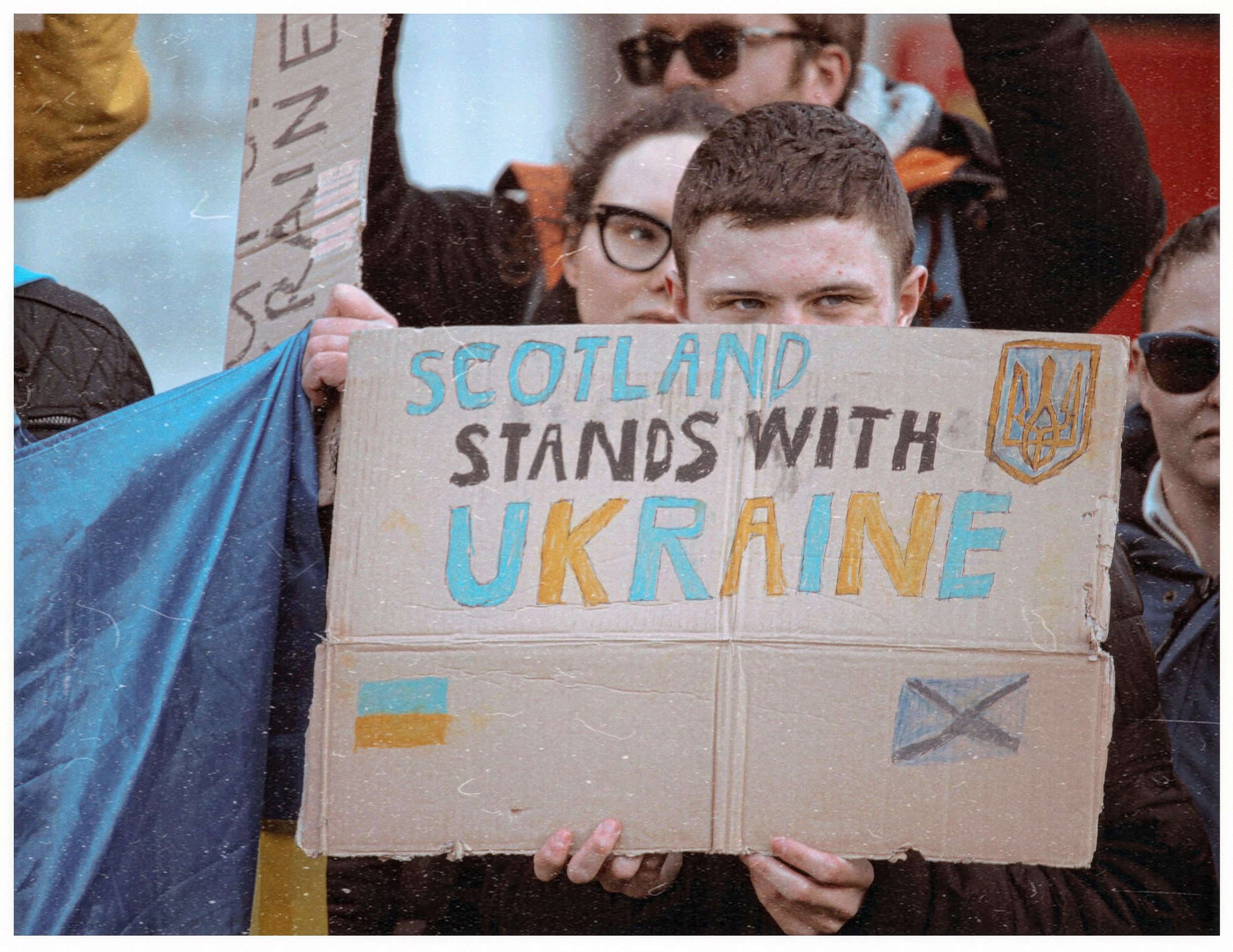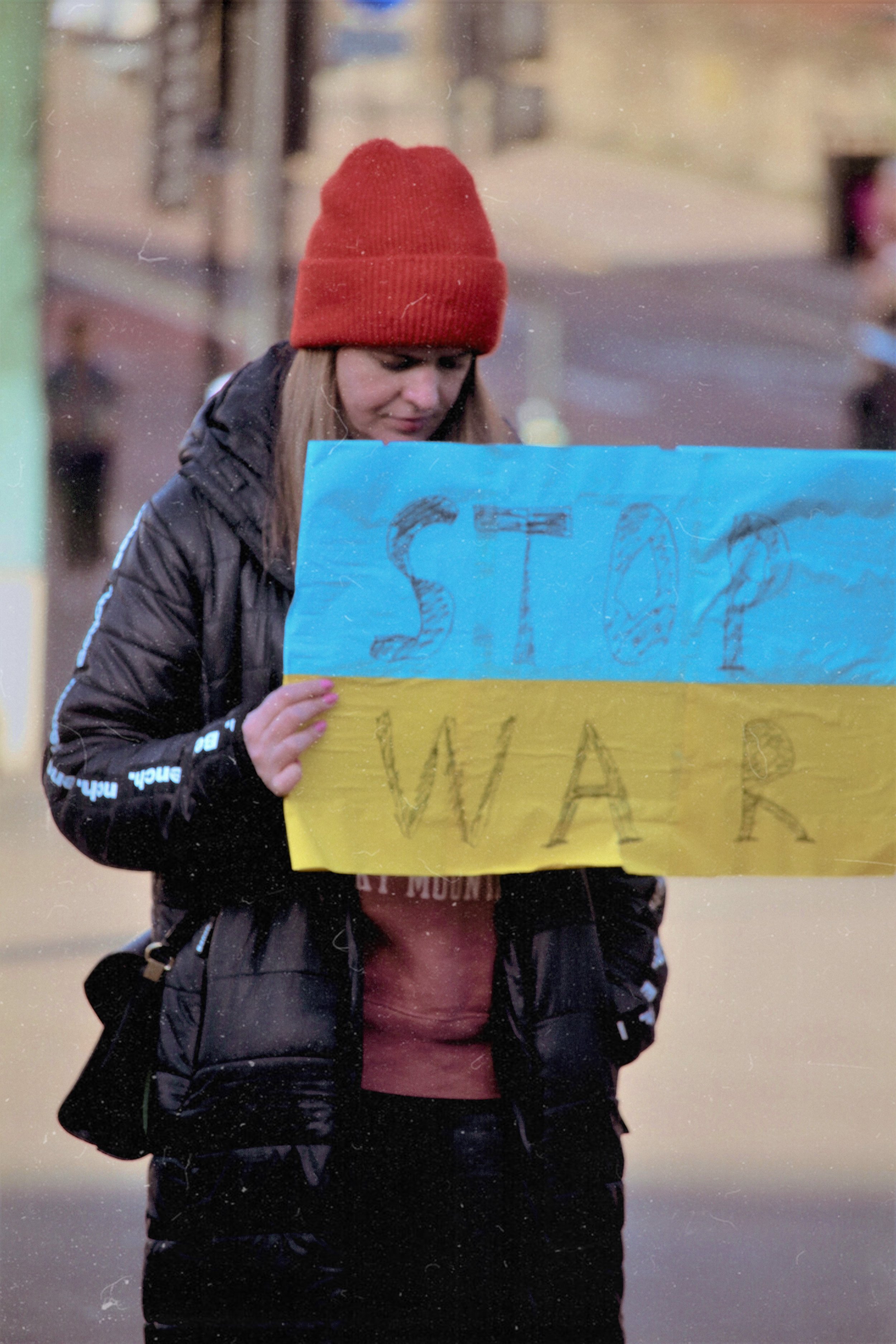The Wait for Ukraine: by Kate Samuels – a Ukrainian in Glasgow
“As Ukrainians we hold on to our culture tightly, as if it might slip away.”
Kate Samuels writes about the pain of watching the war unfolding in Ukraine from so far away, each day wondering what news she will wake up to.
A demonstrator in Glasgow wears a Sunflower - the national flower of Ukraine
By Kate Samuels | Photos by Dylan Lombard
Over the last month I saw the government advice change from green, to orange to red on the official website for traveling to Ukraine. Green means safe to travel, orange only in emergencies and red, you should not travel. When I started writing this a few days ago, you could still enter or leave Ukraine. Not anymore.
I watch the news incessantly, while I await them people keep reaching out to me. They call me, text me, stop me on the street. ‘How is it going?’ they ask, adding in a quieter voice, almost a whisper ‘in Ukraine’. I have been asked this more times than I can count since 2014 when Crimea was taken. Back then after absorbing so many videos of maidan burning I started having nightmares that people I knew and places I knew were on fire.
Before 2014 I used to get sad that the only thing people knew about Ukraine was that it was the setting of the Chernobyl disaster. ‘I really want to go to Chernobyl’ random drunk boys would exclaim at parties, not realising how painful this was to hear, but now I would do anything to bring those days back. Ukraine is known for worse; 8 years of war.
It’s hard to read the headlines over and over that ask ‘Ukrainian crisis; does it matter?’ and complain how much more expensive fuel prices may get if the situation worsens. ‘People live there,’ I want to scream. ‘People have families and lives and jobs there and they are people just like you.’
Ukraine is not a far away place. Its capital Kyiv can be reached in three hours from London by plane. It’s the biggest country in Europe. It exports food that feeds us all. It is home to over 40 million people. The current crisis relates to its relationship with the world and what happens in Ukraine is not only a Ukrainian problem, it’s a global problem.
Read ‘Pickles in a Pandemic’ in which Kate writes about lockdown and finding community
Over the last 30 years millions of people, like me, have left. Until a recent announcement, Ukrainians have not been allowed to hold dual citizenship, which often means that when we choose to leave, we are choosing to leave for good. It can be hard for non-Ukrainians to understand the pain of this. One of my friends held on to Ukrainian citizenship for as long as possible, until the war got in the way and it was no longer safe.
As Ukrainians we hold on to our culture tightly, as if it might slip away. We cook borsch, we listen to songs from home, we celebrate the holidays. We talk to people in the UK about our cities and villages proudly and we still send money home. We feel that being Ukrainian is a core part of our identity and we celebrate each other, whether you are a Ukrainian, Russian or an English speaker.
We want to support Ukraine, but right now many of us can do nothing. Thinking about this I realise how little support there is for those arrivals who come to the UK seeking shelter from war. There might be financial or housing support, but free and accessible mental health support is severely lacking. You are expected to go about your normal life while you worry about your family being killed back home or you have nightmares about shelling or you just need a little extra money to call your family. In an uncertain situation like this – where things might change any minute it’s hard to feel happiness or contentment.
Today I watched the news and wondered which family member might get conscripted against their will? Which area of Ukraine might be in danger next? I sit with these questions and no answers come. The news of peace talks are again shattered. A quiet day is followed by a night of shelling. The situation is growing tenser and more serious by the minute. A nuclear explosion seems possible in my place of birth, Zaporizhia. Another family asks for help coming to the UK and there is nothing we can do – the UK’s immigration laws are amongst the most prohibitive for Ukrainians currently running for their lives.
I call home. I ask. I try to change the conversation to something, anything but the war - but it’s impossible. I hear air raid sirens on the phone. I see so many videos of bombing that sometimes I’m almost surprised when I don’t heard them outside my window. I read poetry about the war. I read about the tough days my mum’s old colleagues have to go through as doctors and I refresh our city’s webcam – hoping it’s switched on again and that peace has once again been restored.
It’s hard to live your life as normal when your home could be the next one to be bombed. There is so much noise, such a heavy feeling of guilt when you are far away and can do nothing. You feel that you should be there right now, back home, helping them.
Read: ‘Today Ukraine, Tomorrow Scotland’ – Ukrainians in Glasgow Speak Out
How you can help
Follow Community of Ukrainians in Glasgow on Facebook for details of demonstrations where you can show solidarity.
Support the Deanston Bakery Bake Sale Fundraiser happening Sunday 6 March from 11am:
Support for Ukrainians in Govanhill
If you have a Ukrainian neighbour or friend in Govanhill or nearby who needs any kind of support, please let them know they can get in touch with Thriving Places Govanhill, especially if they have limited English skills.
They can communicate in Ukrainian, Polish, Russian, and English.
Email: Mantoniak@govanhill.org
Phone: 0141 433 2152



